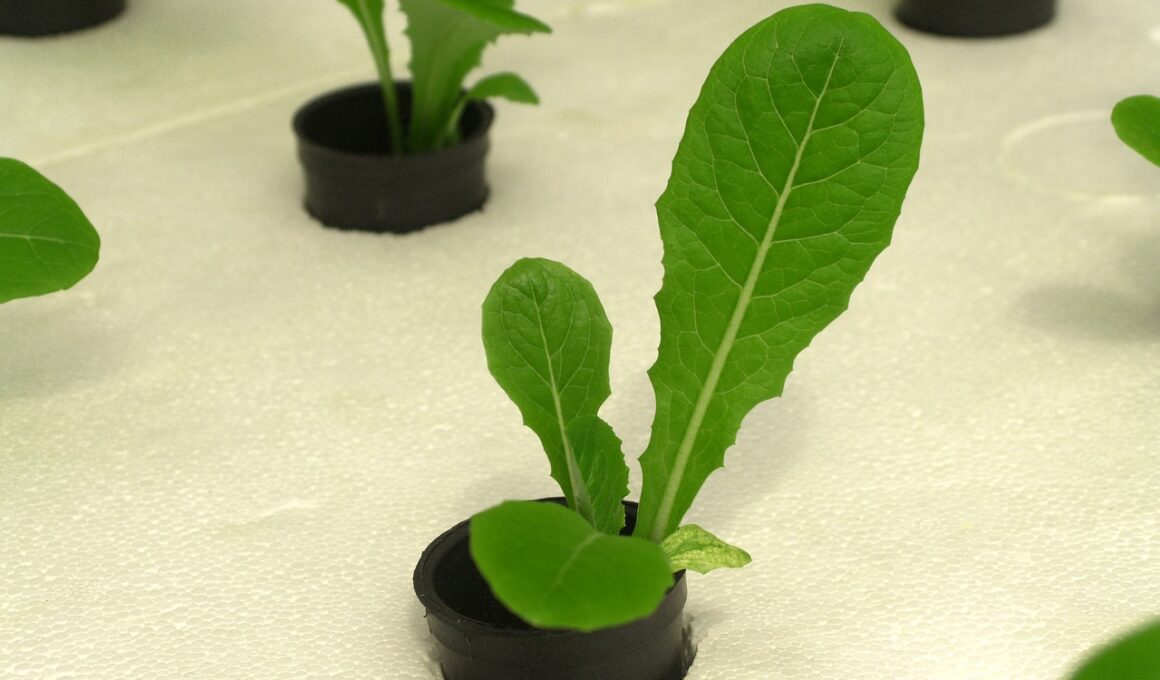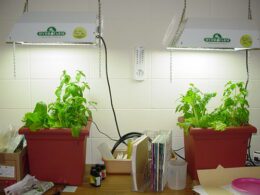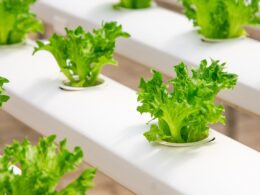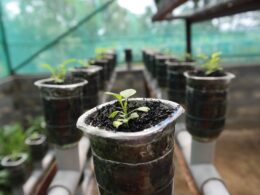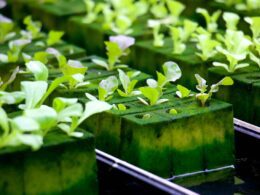Are you interested in growing your own fresh produce at home but don’t have a lot of space or experience with traditional gardening methods? Look no further than hydroponics! Hydroponics is a soilless method of growing plants that uses nutrient-rich water instead. This technique is becoming increasingly popular for its ease of use, high yields, and ability to grow plants in any season.
As a beginner, you may be wondering where to start with hydroponics. There are several different types of hydroponics systems to choose from, each with its own benefits and drawbacks. In this article, we’ll take a closer look at three popular options for beginners:
- Deep water culture
- Drip irrigation
- Aeroponics
We’ll also provide tips on how to choose the right system for your needs, so you can start growing your own delicious and nutritious produce with confidence.
What is Hydroponics and Why is it a Good Option for Beginners?
Looking to grow plants without soil? Hydroponics is an awesome choice for newbies! This method of growing plants uses water and nutrients to feed the plants, rather than soil.
Hydroponics systems offer a range of advantages, including more control over the growing environment and faster plant growth. One of the biggest advantages of hydroponics is that it allows you to grow plants in a controlled environment. You can monitor the temperature, humidity, and nutrient levels to ensure the plants are getting exactly what they need. This means you can adjust the environment to suit the specific needs of the plants you’re growing, and avoid any issues that might arise from growing in soil.
Another advantage of hydroponics is that it can be a cost-effective way to grow plants. While the initial setup can be more expensive than traditional soil-based gardening, hydroponics systems can save you money in the long run. Because you have more control over the growing environment, you can avoid issues like pests and diseases that can damage your plants and cost you money to fix.
Overall, hydroponics is a great option for beginners who want to grow plants without soil. While there are some disadvantages to this method of gardening, like the initial cost of setup and the need for regular monitoring, the benefits far outweigh the drawbacks. So if you’re ready to try your hand at hydroponics, go for it! You’ll be amazed at how fast and healthy your plants can grow.
Deep Water Culture: A Simple and Effective Option
If you want an easy and efficient way to grow plants without soil, all you need is a Deep Water Culture (DWC) set up! DWC is a hydroponic system that allows your plants to grow in a nutrient-rich water solution. The roots of your plants are submerged in the water, and an airstone provides oxygen to the roots. This system is perfect for beginners because it’s easy to set up, maintain, and monitor.
One of the benefits of DWC is that it’s a low maintenance system. Once you’ve set it up, all you need to do is monitor the pH and nutrient levels of the water. DWC also allows your plants to grow faster and with higher yields than traditional soil-based gardening. Plus, since the roots are constantly submerged in water, your plants will never experience drought or overwatering.
When setting up a DWC system, it’s important to choose the right container size for your plants. You’ll also need to invest in a good quality air pump and airstone to ensure that your plants get enough oxygen. It’s also important to monitor the pH and nutrient levels of the water regularly. You can use pH strips or a pH meter to do this. Finally, make sure to choose the right nutrients for your plants and follow the manufacturer’s instructions carefully.
By choosing a DWC system, you’re giving yourself an easy and efficient way to grow healthy and delicious plants. Take the time to set up your system properly and monitor it regularly, and you’ll be rewarded with a bountiful harvest in no time!
Drip Irrigation: A Versatile and Low-Maintenance Option
You’re ready to step up your gardening game, and drip irrigation might be just the versatile and low-maintenance option you’re looking for.
With drip irrigation, water is delivered directly to the roots of your plants through a network of tubes and emitters. This method is highly efficient because it reduces water waste, prevents soil erosion, and ensures that your plants get the exact amount of water they need to thrive.
Drip irrigation is also a cost-effective alternative to other hydroponic systems. You can easily set up a basic drip irrigation system using a few supplies from your local hardware store. Plus, you can customize your system to fit any size or shape of garden space. If you’re on a tight budget, you can even use recycled materials to build your system.
While drip irrigation is a low-maintenance option, you’ll still need to troubleshoot any issues that may arise. Common problems include clogged emitters, leaks, and uneven water distribution. To avoid these issues, make sure to flush your system regularly, check for leaks, and adjust your emitters as needed.
With a little bit of TLC, your drip irrigation system will provide you with a bountiful harvest for years to come.
Aeroponics: A High-Tech Option for Maximum Growth
Aeroponics may be the high-tech solution you’ve been searching for to maximize growth and take your gardening to the next level. This hydroponic system uses aeroponic misters to spray nutrient-rich water directly onto the roots of your plants. By suspending the roots in the air, the plants have access to more oxygen, which allows them to grow faster and produce higher yields.
If you’re considering aeroponics, here are some advantages to keep in mind:
-
Faster growth: With access to more oxygen and nutrients, plants can grow up to five times faster than traditional soil-based gardening.
-
Water efficiency: Aeroponics uses up to 90% less water than traditional gardening, making it a great option for those in dry climates or with limited access to water.
-
Space-saving: Because the system suspends plants in the air and doesn’t require soil, it takes up less space than traditional gardening. This makes it a great option for those with limited outdoor space or who want to grow plants indoors.
-
Customizable: With the nutrient film technique (NFT), you can customize the nutrient solution to meet the specific needs of your plants.
Overall, aeroponics is a high-tech option perfect for those looking to maximize growth and efficiency in their gardening efforts. With its many advantages, it’s definitely worth considering for beginners and experienced gardeners alike.
Choosing the Right Hydroponics System for Your Needs
When deciding which type of hydroponic gardening to pursue, it’s important to consider factors such as budget considerations, space requirements, desired plant growth rate, and water usage.
There are several types of hydroponic systems to choose from, including deep water culture, nutrient film technique, and drip irrigation. Each system has its own advantages and disadvantages, so it’s important to do your research before choosing one.
Deep water culture is a simple and inexpensive system that is great for beginners. It involves suspending plants in a nutrient-rich water solution, with their roots submerged in the water.
Nutrient film technique involves a thin film of nutrient-rich water flowing over the roots of the plants, which are suspended in a trough.
Drip irrigation involves dripping a nutrient-rich solution onto the roots of the plants, which are grown in a soilless medium. This system is more complex and requires more equipment than the other two, but it allows for more control over the nutrient levels.
When choosing the right hydroponics system for your needs, it’s important to consider your budget and space requirements.
Deep water culture is the most affordable and space-efficient option, while nutrient film technique and drip irrigation require more space and equipment. However, they also allow for more control over the plant growth rate and nutrient levels.
Ultimately, the system you choose will depend on your individual needs and preferences, so be sure to do your research and choose the system that is right for you.
Frequently Asked Questions
What types of plants can be grown in a hydroponic system?
When it comes to hydroponic systems, you might be wondering what types of plants you can grow. The good news is that almost any plant can be grown hydroponically, but some are better suited than others.
The best crops for hydroponic systems are those that have a high yield and are easy to grow. Vegetables like lettuce, spinach, and tomatoes are popular choices, as well as herbs like basil and mint. Nutrient solutions are used to provide the plants with the necessary nutrients, so you don’t have to worry about soil quality.
With the right setup and care, you can produce healthy and delicious crops all year long.
Is it more expensive to set up and maintain a hydroponic system compared to traditional soil-based gardening?
When it comes to cost comparison, setting up and maintaining a hydroponic system can be more expensive than traditional soil-based gardening. However, there are DIY options available that can help reduce the overall cost.
In general, hydroponic systems require more specialized equipment and materials, such as grow lights, pumps, and nutrient solutions, which can add up quickly. On the other hand, soil-based gardening may require less upfront investment in equipment, but may involve ongoing expenses for soil amendments and pest control.
Ultimately, the cost of each method will depend on the specific needs of your plants and the size of your garden.
Are there any potential health risks associated with consuming plants grown in hydroponic systems?
When it comes to consuming plants grown in hydroponic systems, there are some potential health concerns to keep in mind.
One issue is the nutrient content of the plants. Some studies have shown that hydroponic plants may have lower levels of certain nutrients compared to those grown in soil.
Additionally, there is a risk of contamination in the water used in hydroponic systems, which could lead to the growth of harmful bacteria or other pathogens.
It’s important to take steps to ensure the safety and cleanliness of your hydroponic system to minimize these risks.
Can hydroponic systems be used for outdoor gardening or are they strictly for indoor use?
Looking to take your gardening game to the next level? Consider outdoor hydroponic systems. These systems offer plenty of benefits, including faster growth, higher yields, and the ability to grow plants in areas with poor soil quality or limited space.
Plus, because hydroponic systems use nutrient-rich water instead of soil, you won’t need to worry about weeding, pests, or other common gardening problems. Whether you’re a seasoned gardener or just starting out, outdoor hydroponic systems are a great way to get the most out of your garden.
How do I know if my hydroponic system requires additional nutrients or adjustments to maintain plant health?
To maintain healthy plants in your hydroponic system, it’s important to monitor their growth regularly. Nutrient deficiency and pH imbalances can occur and lead to stunted growth or even death of your plants.
To troubleshoot these issues, check the nutrient solution levels and adjust them as needed. It’s also important to regularly test the pH levels and adjust them if necessary.
Keep a close eye on the overall health and appearance of your plants, and make adjustments as needed to ensure their continued growth and productivity. By monitoring your hydroponic system closely, you can ensure that your plants stay healthy and thrive.
Conclusion
Congratulations! You’ve just learned about the different hydroponics systems that are perfect for beginners. Hydroponics is a great option for those who want to grow plants without soil, and it can be a fun and rewarding hobby.
If you’re looking for a simple and effective option, Deep Water Culture is a great choice.
For those who want a versatile and low-maintenance option, Drip Irrigation might be the best fit.
And for those who want to go high-tech and maximize growth, Aeroponics is the way to go.
Remember to choose the system that fits your needs and budget. With a little research and some trial and error, you’ll be on your way to growing healthy and vibrant plants in no time.
Happy hydroponic gardening!





